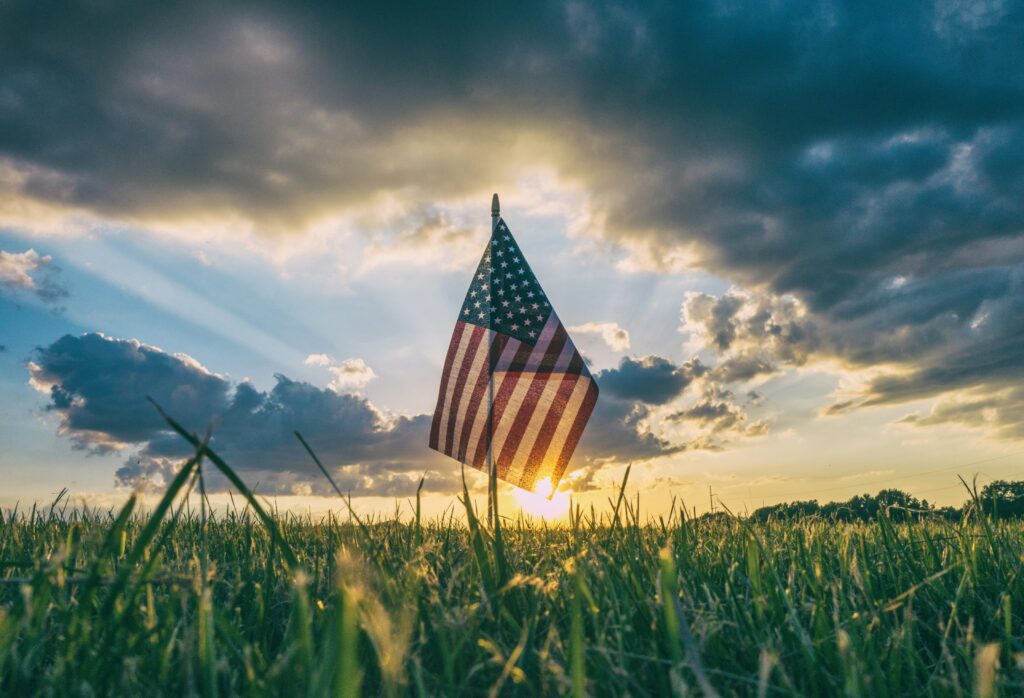Psalm 33:12 says “Blessed is the nation whose God is the LORD, The people whom He has chosen for His own inheritance.” This was referring to Israel, but I’ve always thought of the United States as having some kinship with them. In fact, America has often been called a “Christian nation”.
However, nations can’t be Christian; only individuals can. A nation whose guiding principles align with God — because its citizens are so aligned — will be blessed. Others not guided by God’s principles will not have reason to be blessed by Him.
Our Nation’s Beginnings
When founded, the United States was based on Godly principles. Our founding documents were written by men who honored God. The Declaration of Independence begins by saying that people “are endowed by their Creator with certain unalienable Rights”; it ends with “a firm reliance on the protection of divine Providence” (emphasis added). John Adams wrote that “Our Constitution was made only for a moral and religious People. It is wholly inadequate to the government of any other.” 1
It’s very true that our society has had times when we betrayed these principles. Slavery is noted most often, of course. 2 But there was also the treatment of the indigenous people during the westward expansion, and of Japanese Americans during World War II. Many people, of many ethnic or social backgrounds, have been treated disrespectfully at times.
But for the most part, these principles have remained our common goals. Americans of all backgrounds and walks of life have agreed on the definition of moral behavior. Our ideal of individual freedom — that each person makes their own choices and reaps the resulting benefits (or consequences) of their own actions — has roots in the Biblical teaching that everyone is both infinitely valuable and also individually responsible to God. Our instinct to be charitable comes from the knowledge that we have been blessed, and have a responsibility to share those blessings with others who are less fortunate.
Our Nation’s Blessings
As a result of the freedoms, rights, and responsibilities laid out in our government’s foundation, America has been greatly blessed for almost 250 years. People have flocked here from all over the world, seeking opportunities that they are denied elsewhere. They have used those opportunities to develop businesses, invent products, advance scientific knowledge, and provide lifestyles that would have previously been unimaginable.
A few years ago, I sponsored a child through Compassion. Shortly after receiving my packet of information about the child, her family, and her town, we happened to go for a drive that passed some less-than-affluent areas. I was (rightfully, I think) unhappy with the conditions I saw. Then I realized that these homes had floors, and electricity, and running water. My sponsor child’s home did not. Our poorest areas have more than much of the world; our “typical” lives are more luxurious than those of the top noblemen of a century ago; our wealthy have resources and power that rival small countries. We are indeed very blessed.
Our Nation’s Danger
I watch in concern these days as more and more of my fellow citizens appear to be turning away from God. They defy God’s definition of moral behavior and replace it with their own. They replace equal individual value and responsibility with group identification. They replace freely-chosen sharing of blessings with coerced income re-distribution. They “exchange the truth of God for a lie” (Romans 1:25). They “call evil good, and good evil, substitute darkness for light and light for darkness, substitute bitter for sweet and sweet for bitter” (Isaiah 5:20). Finally, they replace the Creator’s unalienable rights with government’s fickle assurances, and replace reliance on divine Providence with reliance on government care-taking. They put their hope in political solutions rather than God’s sovereignty.
Again in kinship with Israel, here is what God said would happen under similar conditions:
But if you turn away and forsake My statutes and My commandments which I have set before you, and go and serve other gods and worship them, then I will uproot you from My land which I have given you…
2 Chronicles 7:19-20
Our Nation’s Hope
But God also gave a solution:
If I shut up the heavens so that there is no rain, or if I command the locust to devour the land, or if I send pestilence among My people, and My people who are called by My name humble themselves and pray and seek My face and turn from their wicked ways, then I will hear from heaven, will forgive their sin and will heal their land.
2 Chronicles 7:13-14
Here in the United States, “My people who are called by My name” would refer to America’s Christians. Easy and tempting though it may be to point at all those awful people “out there”, God calls for His people on the “inside” to repent, pray, and seek His face. We are not called to overthrow our society. Rather, we are called to gently influence it for God and to demonstrate that His ways bring life 3.
It seems that our “Christian” nation is working hard to earn judgment. If that comes, then it is only just. But we love and serve a God of mercy as well as justice. He is “is patient toward you, not wishing for any to perish but for all to come to repentance.” (2 Peter 3:9)
May His Spirit move in the hearts of all American citizens, one at a time, turning our country toward Him for His mercy … and His continued blessings.
Footnotes and Scripture References
- If you take a moment to read the old-fashioned language in that short letter, you will see that Adams recognized the same danger that I do in this post.
- Although, to be fair, legal slavery was ended in America over 150 years ago, while it is still common in many countries around the world. See these resources: Countries that Still Have Slavery, What is modern slavery, Slavery in History.
- For more on the idea of Christian influence on society, see this article on Faith and Politics.


